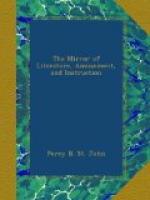“And thou, original writer, her admirer and her friend, it was Eliza who inspired thy works, and dictated to thee the most affecting pages of them. Fortunate Sterne, thou art no more, and I am left behind. I wept over thee with Eliza; thou wouldst weep over her with me: and had it been the will of Heaven, that you had both survived me, your tears would have fallen together upon my grave.
“The men were used to say, that no woman had so many graces as Eliza: the women said so too. They all praised her candour; they all extolled her sensibility; they were all ambitious of the honour of her acquaintance. The stings of envy were never pointed against unconscious merit.
“Anjengo, it is to the influence of thy happy climate that she certainly was indebted for that almost incompatible harmony of voluptuousness and decency which diffused itself over all her person, and accompanied all her motions. A statuary who would have wished to represent Voluptuousness, would have taken her for his model; and she would equally have served for him who might have had a figure of Modesty to display. Even the gloomy and clouded sky of England had not been able to obscure the brightness of that aerial kind of soul, unknown in our climates. In every thing that Eliza did, an irresistible charm was diffused around her. Desire, but of a timid and bashful cast, followed her steps in silence. Any man of courteousness alone must have loved her, but would not have dared to own his passion.
“I search for Eliza every where; I discover, I discern, some of her features, some of her charms, scattered among those women whose figure is most interesting. But what is become of her who united them all? Nature, who hast exhausted thy gifts to form an Eliza, didst thou create her only for one moment? Didst thou make her to be admired for one instant, and to be for ever regretted?
“All who have seen Eliza regret her. As for myself, my tears will never cease to flow for her all the time I have to live. But is this sufficient! Those who have known her tenderness for me, the confidence she had bestowed upon me, will they not say to me—She is no more, and yet thou livest.
“Eliza intended to quit her country, her relations, her friends, to take up her residence along with me, and spend her days in the midst of mine. What happiness had I not promised to myself? What joy did I not expect, from seeing her sought after by men of genius, and beloved by women of the nicest taste? I said to myself, Eliza is young, and thou art near thy latter end. It is she who will close thine eyes. Vain hope! Fatal reverse of all human probabilities! My old age has been prolonged beyond the days of her youth. There is now no person in the world existing for me. Fate has condemned me to live, and die alone.




